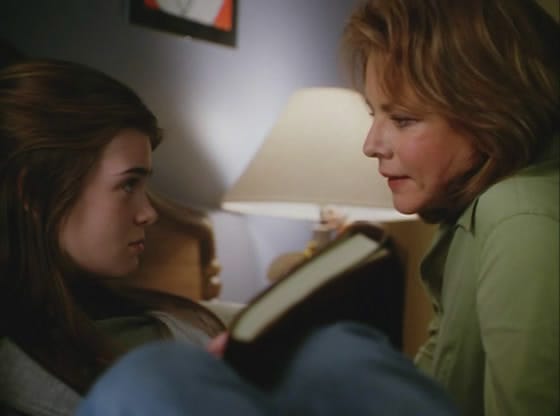the truth about jane
TV Movie, 2000, 3.5 stars
Written and Directed: Lee Rose
Writer/Director Lee Rose may well have been the most important lesbian working in TV during the 90's and early 2000s. Sure, Ilene Chaiken did well over on Showtime with The L Word, but in a way that is a show that preaches to the converted—open minded lesbians, gay men and heterosexuals who are looking for something sexy and trashy to drool at.
The vast majority of conservative parents and teens will never see an episode of The L Word. The idea of watching a show advertised as being about lesbians having sex will scare them off, or they just might not be old enough to tune in yet.
However, these people might accidentally tune into the Lifestyle or Hallmark channel one day and catch a re-run of The Truth About Jane and it just might change the way they look at the world. Lee Rose took the coming out story to the masses and succeeded in ways I wouldn't have thought possible.
Sure, these films are like after-school specials, but Mary Poppins was right when she said a spoonful of sugar helps the medicine go down, and this is medicine that decades later many families still need.
I wish desperately The Truth About Jane had been around when I was fifteen and confused (and I would have had a hell of a crush on Ellen Muth if it had been!) This film punches home the strongest and most important message—that the worst thing a child can ever experience is being rejected by the two people they most depend on, for any reason.
Jane (Ellen Muth) is an all-American teen starting her first year of high school. Her overprotective parents Janice (Stockard Channing) and Robert (James Naughton) watch her growing up with some trepidation. The thought of Jane growing up and going off into the world scares them to death. Jane still lives at home but Janice is already exhibiting signs of abandonment syndrome. Her little girl is growing up, and she doesn't like it one bit.
Meanwhile Jane knows that she's not the perfect teen everyone expects her to be. She feels nothing for boys, not even cute new guy Ned who seems to like her. When Taylor, a new girl in her English class, asks for some help with her homework, Jane's life gets turned upside down. Suddenly Jane understands what has made her feel so different. She's gay. Coming to that realisation is just the beginning of her problems. She has to tell her parents, and when she does the shit hits the fan.
Just when we think this is going to be just another coming out sob story, the film takes a turn. The narrative becomes more about Janice than about Jane herself. While I think this is useful, especially the interaction between Janice and Lynn Wolcott (Jane's lesbian schoolteacher), the second half does move from sweet to melodramatic to preachy at a dizzying rate. The final act is like an advertisement for PFLAG rather than a narrative, but hey, whatever gets the message across.
I think to make the sappy ending work we really needed to get a sense that more time had passed. As it was, the film actually specifies that it is something like two weeks between Janice's first PFLAG meeting and Jane insisting her mother come along to the gay pride rally. Janice does go, still with huge reservations, but it is a massive step and not one I would think any parent seriously struggling with a child's sexuality could make in that short a time.
But the point of the film is to promote reconcilation and acceptance amongst families, and if the truth of how long it actually takes has to be stretched a little en route then that's the way it has to be.
Ellen Muth belongs to that small group of younger actresses (including Evan Rachel Wood) who are poised, intelligent, exhibit a wonderfully dry sense of humour and who have the ability to deliver dialogue with perfect comic and dramatic timing. Muth steals this film from under the consistently brilliant Stockard Channing and makes the most of what is sometimes droll, TV Movie writing.
Lesbians of all ages will find a lot to like here. It doesn't shy away from intimacy (watch out for the kissing of the fingertips scene though!) and I liked the fact that the two girls don't just kiss and hold hands, they actually have sex. I'm not saying that's what should happen, I'm just saying that it does.
We don't see any of that onscreen, which is suitable for the format, but we know it happens and Jane is emotionally moved by the experience, which is how it should be. No matter how much films these days like to trivialise sex, when it happens to teenagers for the first time it is a big deal and there's nothing wrong with films treating it as such.
There's no comparing this bland-ish made-for-TV film with the edgy brilliance of indie features like All Over Me and Show Me Love, but an independent film can be great, but no one will know if they never get the chance to see it.
What makes The Truth About Jane worth so much more than the sum of its parts is the medium. Television will bring this story to millions of people. This little film might not be perfect but it is good enough, and it will be seen. Maybe somehow, somewhere, it will make a difference for someone.




